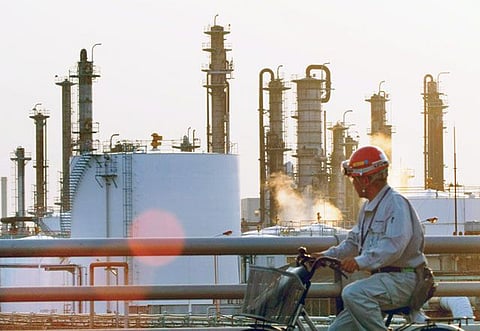IEA will deploy emergency oil stockpiles to ease soaring prices
Riyadh has signaled that it doesn't consider markets to be tight enough

New York: The US and other major economies have agreed on a coordinated release of oil stockpiles after Russia's invasion of Ukraine pushed crude above $100 a barrel, according to people familiar with the matter.
The International Energy Agency, which represents key industrialized consumers including Japan and Germany, has agreed to deploy 60 million barrels from stockpiles around the world, the people said. That will mark the second release from American crude reserves within a few months as soaring fuel costs become a growing political problem for President Joe Biden.
The US Energy Department declined to comment. The IEA couldn't immediately be reached for comment.
Crude prices shot above $105 a barrel in London for the first time since 2014 on fears that oil and gas supplies from energy giant Russia could be disrupted, either by the conflict in Ukraine or retaliatory western sanctions. The rally is exacerbating an inflationary surge for energy-consuming nations, threatening the economic recovery and worsening a cost-of-living crisis for millions.
Tighter supply
Russia's aggression has spooked a market already tightened by a vigorous recovery in demand as the pandemic eases, and constraints on supply owing to under-investment and disruptions around the world. Trading giants Vitol Group and Trafigura Ltd. expect triple-digit prices to continue for a prolonged period.
The IEA's intervention comes after the OPEC+ coalition, which is led by Saudi Arabia and Russia, disregarded encouragement from Biden last year to increase supplies more quickly. The group meets again on March 2 to discuss its production plans for April.
Riyadh has signaled that it doesn't consider markets to be tight enough to speed up the restoration of production that the Organization of Petroleum Exporting Countries and its partners halted during the pandemic. Many other nations in the 23-member alliance couldn't increase supplies any faster even if they chose to, owing to lack of investment and instability.
It's the first time the IEA has made a synchronised release of oil stocks since the Libyan civil war in 2011. There are echoes of that crisis in today's events: It was Riyadh's reluctance to open the taps a decade ago to offset the disruption caused by the uprising against dictator Moammar Qaddafi that prompted the agency into action.
Previous deployments came during the 1991 Gulf War, and the onslaught of hurricanes Rita and Katrina in 2005, making this just the fourth such intervention in the IEA's five-decade history.
The IEA's 30 members, drawn from the Organization for Economic Cooperation and Development, include the U.S., Japan, Germany and France.



